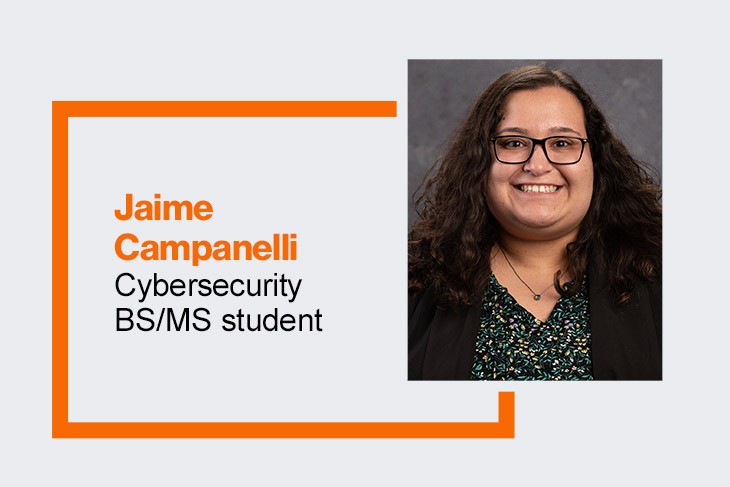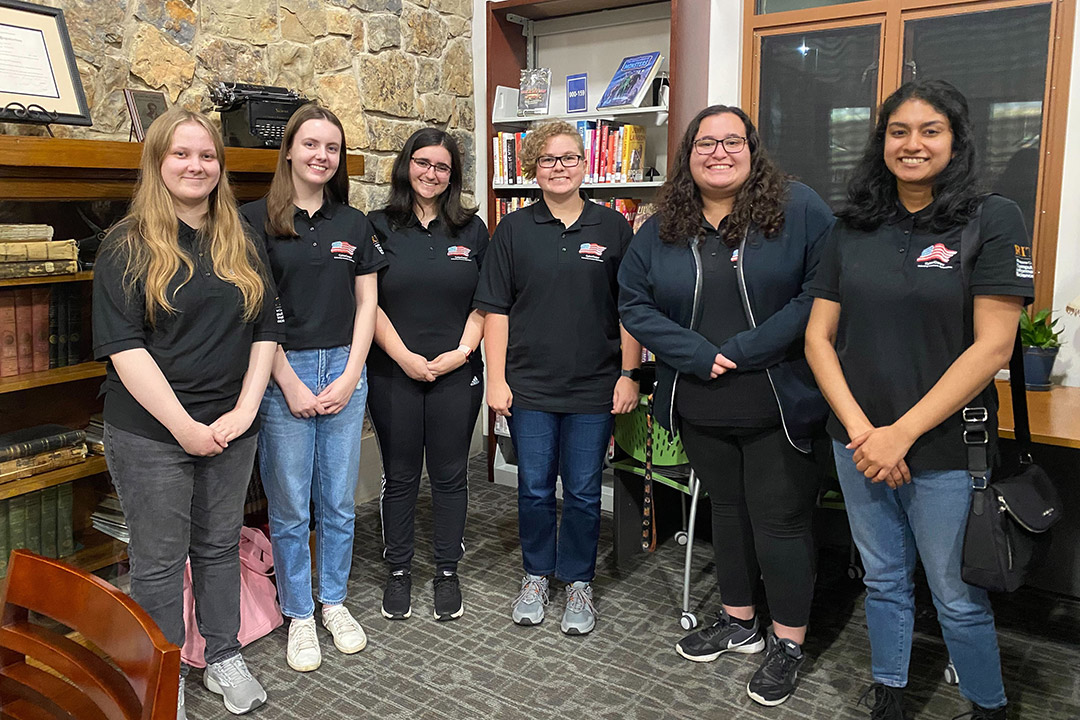NSF CyberCorps Scholarship for Service recipient educates Rochester students and seniors on cybersecurity
Fifth-year cybersecurity student Jaime Campanelli works to educate students and senior citizens about online safety and cybersecurity careers as a NSF CyberCorps Scholarship for Service (SFS) recipient.
As a recipient of the NSF CyberCorps Scholarship for Service (SFS), fifth-year student Jaime Campanelli has dedicated herself to educating the public about cybersecurity. Students in the CyberCorps SFS program work for the U.S. government in information protection and assurance roles following their graduation. Campanelli is from Merrick, N.Y., and is in the cybersecurity BS/MS program, with a minor in public policy. Alongside other RIT students, she has planned and led several outreach events at middle schools, high schools, and libraries in the Rochester area. During these events, Campanelli teaches about internet safety and cybersecurity careers.
Provided photo
Students in the CyberCorps SFS program work for the U.S. government in information protection and assurance roles following their graduation. Pictured, from left to right, are CyberCorps SFS recipients Nia Poor, Alexa Krempa, Carly Etlinger, Emma Lubes, Jaime Campanelli, and Lalitha Donga.
What drew you to the NSF CyberCorps Scholarship for Service program?
I was drawn to the CyberCorps Scholarship for Service program at RIT by my deep-seated passion for public service and a strong commitment to community engagement. The chance to contribute to the U.S. government’s work strongly aligned with my career goals. When applying for RIT’s CyberCorps Scholarship for Service program, I learned about its mission to lead outreach to the community, which I knew I wanted to be a part of and help run. I am very grateful to have been granted this opportunity and ever so thankful for my principal investigators and fellow scholars.
Why is cybersecurity so important for middle- and high-school students to understand?
Cybersecurity is very important for middle- and high-school students to understand because of the pivotal role technology plays in our world. It is essential for the students to not only understand it but also to take part in ways to improve it while staying safe and secure. By teaching students an introduction to cybersecurity, my fellow scholars and I introduce them to diverse career paths and valuable skills that I didn’t know until I came to RIT. Early exposure allows them to explore their interests and potentially inspires them to join the STEM field. It truly is my passion to educate the future generation about cybersecurity and make meaningful contributions to the community.
What are some of the most important pieces of advice about cybersecurity you give to middle- and high-school students during your sessions with them?
Here are some things I have told them. First, it is crucial to exercise caution when on the internet, using devices, interacting with others, and especially when receiving suspicious emails, texts, or phone calls. Second, in regard to digital footprints, it is crucial to be aware of your online presence. You never know who can see your posts, and I emphasize to the students the importance of privacy and what not to post. And last, when choosing a career path to explore, make sure it aligns with your passion and interests. Since cybersecurity is a rapidly evolving field, there are many different avenues to explore.
What makes service a valuable part of becoming a cybersecurity professional?
Service is a valuable part of becoming a cybersecurity professional in order to dedicate ourselves to safeguarding the public. By educating individuals and organizations on how to stay safe and secure, it creates a safer digital environment for society as a whole. With an uptick in the evolution of cyber threats, it is important for cybersecurity professionals to share their knowledge about how individuals need to protect themselves. Service in educational outreach allows cybersecurity professionals to raise awareness to those who wouldn’t know otherwise. This can increase their skills in detecting threats and staying safe on the internet, while promoting an open collaboration with the community.
What kinds of service projects are you planning for the future as part of the CyberCorps program?
Some future outreach service projects I am planning for the RIT CyberCorps SFS program is to further engage with local libraries and schools. To this date, we have held 11 events at local libraries to teach senior citizens about cybersecurity – such as identifying email scams, internet safety, how to make a good password, etc. By this alone, we have impacted the lives of over 130 senior citizens. I am working on scheduling more events like this because senior citizens are a highly targeted group in the world of cybersecurity, and it is important to me that they know how to stay safe. On the other side, I am also passionate about outreach to K-12 students. I am planning on reaching out to more local schools to continue teaching them about cybersecurity, encryption, malware, cybersecurity career paths, and internet safety, among other things. In the past year, we have had four different high school visits, and it was a humbling experience to work and educate students on such an important topic. Lastly, RIT CyberCorps SFS will be having a booth at RIT’s Imagine RIT festival in late April 2024, where my fellow scholars and I will have cybersecurity demonstrations throughout the day. We are planning on teaching the community about cryptography, covert communication channels, malware, and other general cybersecurity topics. We are also having an interactive K-12 cybersecurity game where students can test their knowledge.














